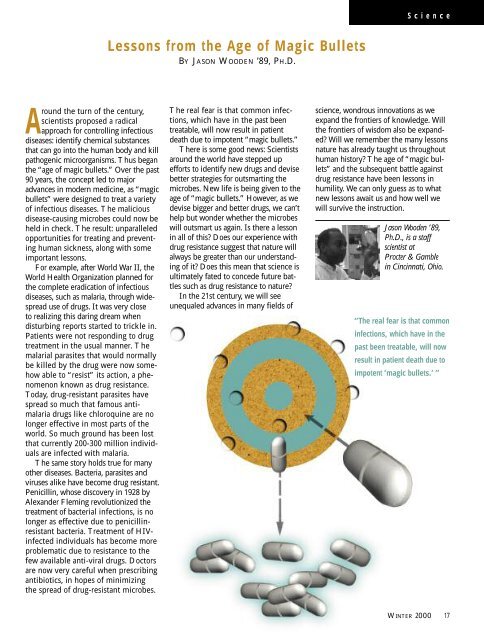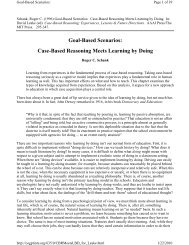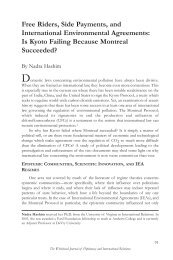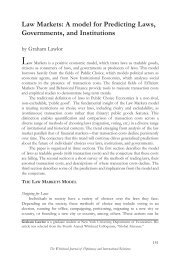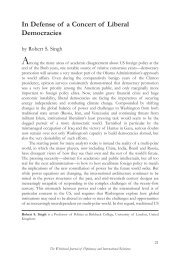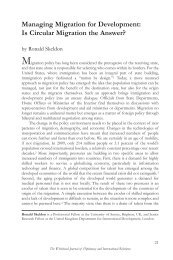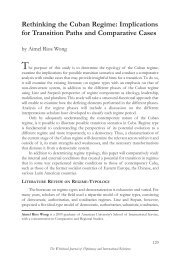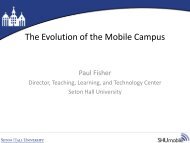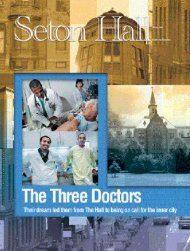Seton Hall Magazine, Winter 2000 - Seton Hall University
Seton Hall Magazine, Winter 2000 - Seton Hall University
Seton Hall Magazine, Winter 2000 - Seton Hall University
You also want an ePaper? Increase the reach of your titles
YUMPU automatically turns print PDFs into web optimized ePapers that Google loves.
Around the turn of the century,<br />
scientists proposed a radical<br />
approach for controlling infectious<br />
diseases: identify chemical substances<br />
that can go into the human body and kill<br />
pathogenic microorganisms. Thus began<br />
the “age of magic bullets.” Over the past<br />
90 years, the concept led to major<br />
advances in modern medicine, as “magic<br />
bullets” were designed to treat a variety<br />
of infectious diseases. The malicious<br />
disease-causing microbes could now be<br />
held in check. The result: unparalleled<br />
opportunities for treating and preventing<br />
human sickness, along with some<br />
important lessons.<br />
For example, after World War II, the<br />
World Health Organization planned for<br />
the complete eradication of infectious<br />
diseases, such as malaria, through widespread<br />
use of drugs. It was very close<br />
to realizing this daring dream when<br />
disturbing reports started to trickle in.<br />
Patients were not responding to drug<br />
treatment in the usual manner. The<br />
malarial parasites that would normally<br />
be killed by the drug were now somehow<br />
able to “resist” its action, a phenomenon<br />
known as drug resistance.<br />
Today, drug-resistant parasites have<br />
spread so much that famous antimalaria<br />
drugs like chloroquine are no<br />
longer effective in most parts of the<br />
world. So much ground has been lost<br />
that currently 200-300 million individuals<br />
are infected with malaria.<br />
The same story holds true for many<br />
other diseases. Bacteria, parasites and<br />
viruses alike have become drug resistant.<br />
Penicillin, whose discovery in 1928 by<br />
Alexander Fleming revolutionized the<br />
treatment of bacterial infections, is no<br />
longer as effective due to penicillinresistant<br />
bacteria. Treatment of HIVinfected<br />
individuals has become more<br />
problematic due to resistance to the<br />
few available anti-viral drugs. Doctors<br />
are now very careful when prescribing<br />
antibiotics, in hopes of minimizing<br />
the spread of drug-resistant microbes.<br />
Lessons from the Age of Magic Bullets<br />
BY JASON WOODEN ’89, PH.D.<br />
The real fear is that common infections,<br />
which have in the past been<br />
treatable, will now result in patient<br />
death due to impotent “magic bullets.”<br />
There is some good news: Scientists<br />
around the world have stepped up<br />
efforts to identify new drugs and devise<br />
better strategies for outsmarting the<br />
microbes. New life is being given to the<br />
age of “magic bullets.” However, as we<br />
devise bigger and better drugs, we can’t<br />
help but wonder whether the microbes<br />
will outsmart us again. Is there a lesson<br />
in all of this? Does our experience with<br />
drug resistance suggest that nature will<br />
always be greater than our understanding<br />
of it? Does this mean that science is<br />
ultimately fated to concede future battles<br />
such as drug resistance to nature?<br />
In the 21st century, we will see<br />
unequaled advances in many fields of<br />
S c i e n c e<br />
science, wondrous innovations as we<br />
expand the frontiers of knowledge. Will<br />
the frontiers of wisdom also be expanded?<br />
Will we remember the many lessons<br />
nature has already taught us throughout<br />
human history? The age of “magic bullets”<br />
and the subsequent battle against<br />
drug resistance have been lessons in<br />
humility. We can only guess as to what<br />
new lessons await us and how well we<br />
will survive the instruction.<br />
Jason Wooden ’89,<br />
Ph.D., is a staff<br />
scientist at<br />
Procter & Gamble<br />
in Cincinnati, Ohio.<br />
“The real fear is that common<br />
infections, which have in the<br />
past been treatable, will now<br />
result in patient death due to<br />
impotent ‘magic bullets.’ ”<br />
WINTER <strong>2000</strong> 17


